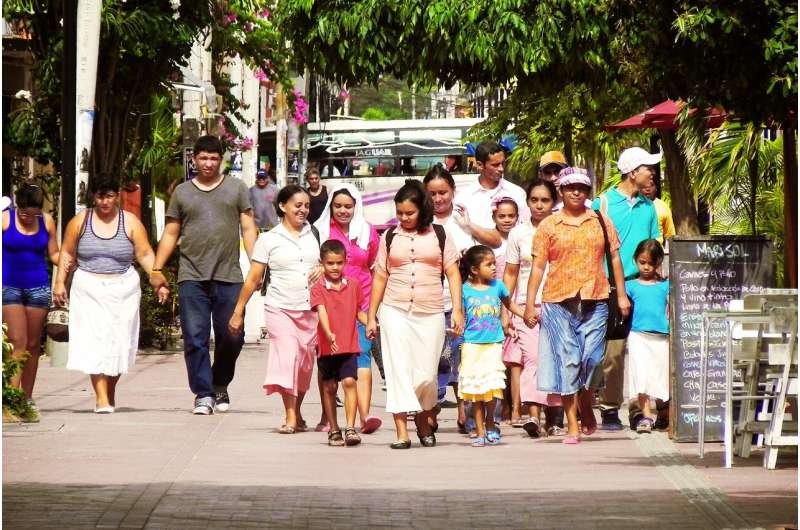This article has been reviewed according to Science X's editorial process and policies. Editors have highlighted the following attributes while ensuring the content's credibility:
fact-checked
trusted source
proofread
Study: Discrimination, marginalization among Latinos leads to poorer mental, physical health outcomes

Latino adults in the United States with documentation status concerns—such as fearing deportation—report poorer physical and mental health than individuals without those concerns, according to a new University of Michigan study.
Regardless of their documentation status distresses, Latino participants who feel a stronger sense of support report fewer negative mental health symptoms, the research shows.
"Building a positive sense of community, whether among friends, family and neighbors, or organizations like churches and community centers, serves as a protective shield from anti-immigrant sentiments and systemic discrimination," said first author Fernanda Lima Cross, an assistant professor at the U-M School of Social Work.
"Having a social support network promotes feelings of belonging, which is helpful to those navigating this country as Latinx immigrants."
According to the Migration Policy Institute, there are about 11 million undocumented immigrants in the U.S., with the majority being of Latino descent. Despite the large size of this population, access to resources supporting mental and physical health is relatively low due to social, systemic and linguistic barriers.
Gaps arise from undocumented status, further exacerbating individuals' ability to access resources—increasing their propensity for undiagnosed mental and physical health issues.
The awareness of potential discrimination from government officials, health care professionals and everyday encounters discourages undocumented individuals from seeking care, say Cross and colleagues, who talked to nearly 500 Latino adults in Washtenaw County, Michigan, in 2013-14.
"The goal of this data collection was to provide a snapshot of the health and mental health of the Latinx population of the county to increase awareness of the community's needs and strengths, which can support program and intervention development as well as provide information to agencies and clinicians working with the community," Cross said.
Even though the data is from a decade ago, the results are still applicable today, Cross says. When the data was collected, Latino immigrants in Washtenaw County lived in hypervigilance due to community raids under the Obama administration. Since then, Latino immigrants continued to experience marginalization and discrimination throughout the Trump administration, she says.
"Then, we were all hit with the COVID-19 pandemic that not only impacted Latinx communities more deeply, it also brought to light the role of social determinants of health as underlying factors contributing to health disparities," Cross said. "We are now starting to find a new normal after the pandemic and know that feeling supported by those around us makes a difference. Our results provide empirical support for this claim."
The results, which appear in the Journal of Racial and Ethnic Health Disparities, suggest that supporting the Latino community in Washtenaw County directly impacts their health.
"Social support positively impacts Latinx individuals' health," Cross said. "About 90% of our participants were foreign-born, and 60% had lived in the U.S. for at least 10 years. These percentages demonstrate the power of feeling supported in their community even for those more established immigrants."
In the 2010s, when Casa Latina existed, Latino families and individuals had a space to congregate and find support, Cross says.
"We no longer have this, but the need remains," she said. "We need more programs and physical spaces to support Latinx immigrants, where they feel safe, welcomed and included, especially those with documentation status concerns. Expressing support to this community can come from any of us."
More information: Fernanda Lima Cross et al, The Role of Documentation Status Concerns, Perceived Discrimination, and Social Support on Latinx Adults' Physical and Mental Health, Journal of Racial and Ethnic Health Disparities (2023). DOI: 10.1007/s40615-023-01575-9

















